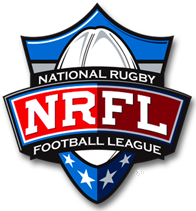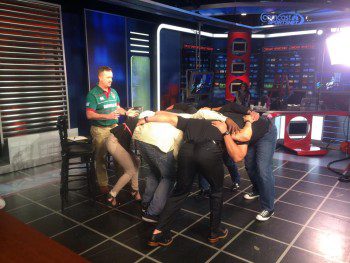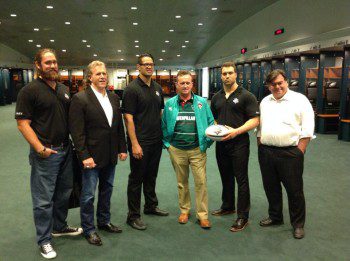

Thanks to Grant Cole of This Is Texas Rugby for today’s piece. Inside The NRFL (On Twitter @InsideTheNRFL) is Grant’s look at the NRFL via his personal interactions with its founders. You can also find this one-time Marine Corps rugger on Twitter @ThisIsTxRugby) for the TIAR Network.
PHILADELPHIA, PA – Welcome to Inside the NRFL.
You may have seen the Philadelphia Eagles press release about the NRFL Rough Riders playing the Leicester Tigers at Lincoln-Financial Field on August 8th at 3pm. You may have read Leicester’s press release confirming the Tigers participation in the match. Maybe you even paid attention to the NRFL’s Combine reports, checked out their website or trolled any number of Internet comment threads where folks not involved in the NRFL predicted the Independence Cup would not happen – or decried what they think the NRFL might become.
Let’s put all that aside for a moment…
Rugby Law and the National Rugby Football League were founded by two old club rugby players, Mike Clements and George “Mac” Robertson, after an old boys match in Aspen, CO about six years ago. Mike and Mac discussed rugby over a few pints. The discussion ran the familiar gamut of club experiences, trying to build a better club, what the national team could do to improve and ended at about how each would run a rugby competition as a business.
That discussion grew legs that would not stop running and Mike & Mac decided at that moment to stop playing – to focus on their plan – and never looked back. They had played rugby, administrated clubs, coached rugby or planned and ran rugby tournaments and fund-raising events for decades. They knew the time had arrived to take all of that rugby experience and knowledge, combine it with the years of legal (Mike) and business (Mac) acumen that so successfully put food on their families’ tables and roofs over their heads, and realize the dream of a professional rugby competition in the USA.
The professional rugby concepts stateside had not worked up to that point. Major League Rugby failed to obtain referees. The Rugby Super League was on its last legs. The North American Four tanked. Grand Prix Entertainment took us all for a ride on the sham-wagon. Any talk of a professional rugby competition stateside came off as all hat and no cattle. Folks looked to USA Rugby for an answer, but few realized that national governing bodies of sports in the USA are relegated to sanctioning amateur events and competitions within their purview. The answer was never coming from within.
 Few folks who wanted a professional rugby competition understood how to create and develop a commercially viable business to make that happen. Mike and Mac created commercially viable businesses previously, and knew the legal foundation for a business to be the toughest obstacle to face. Thus, RugbyLaw, LLC. was born.
Few folks who wanted a professional rugby competition understood how to create and develop a commercially viable business to make that happen. Mike and Mac created commercially viable businesses previously, and knew the legal foundation for a business to be the toughest obstacle to face. Thus, RugbyLaw, LLC. was born.
From there, RugbyLaw endeavored to know and understand the ins and outs of sports entertainment. Successfully running amateur rugby clubs and major regional tournaments is one thing, but pooling together enough interested investors to launch a sports entertainment, doing the market research, determining what the American sports fan really wants to spend their money on requires a completely different knowledge base and data set. Not to mention cojones the size of Dallas and Ft Worth.
No one is under any pretense that starting a professional rugby competition in the USA is easy. Mike and Mac had no illusions about this, either. But they knew that tons of rugby-ready elite American athletes received no opportunity to play the sport played in heaven. As hard as they and their friends worked to change that dynamic in club rugby for decades, it just did not happen at the pace anyone thought it should. Why would an elite athlete switch sports to amateur club rugby that practices only twice a week and the only starting spot is on the wing where you might or might not get the ball? The camera is not on you and your agent is still beating the bushes for you in paying jobs. Why play amateur club rugby when there remains the smallest sliver of a chance to get paid in the bigs if they just work a little harder, run a little faster, and not risk injury as an amateur?
So six years ago, Mike and Mac embarked on a journey to bring the sport they had loved for decades to the American people in the spirit of the American entrepreneur. They discovered two primary things in the path to the Independence Cup:
1) American interest in rugby is at an all time high. 8% of the American population supports rugby union and 2% loves rugby union. That’s 22.9 million people. That’s a niche market and something to build upon, especially in a country that averages revenue from professional rugby of $0/year. Compare that to France where 42% (21.7 million) of the population support rugby union and 11% (5.7 million) loves rugby union. These 27.4 million French sports fans generate $259 million a year in revenue for professional rugby. Add to these numbers that 41% (96 million) of the American population stands neutral on rugby and RugbyLaw saw opportunity in an established niche market plus a possible swing market that stood largely untapped. It’s a risky bet that the American sports fan WILL fall in love will rugby enough to produce a quarter a billion a year in revenue after 3-5 of business. Placing that bet when American interest in rugby is at an all time high seems like the best time. (SMG Insight, The Global Fan Base of Rugby Union, 2013)
2) Americans love elite athletes. Americans do not care where the athletes call home. They can be Americans such as J.J. Watt, Bo Jackson, Deion Sanders, Derek Jeter, or Michael Jordan; or internationals like Manu Genobli, Steve Nash, Jaromir Jagr, Sergei Fedorov, or Jose Abreu. Americans like athletes strong, fast, and skilled. RugbyLaw, like the rest of us, knew that plenty of these types of athletes were available to please the untapped market. Some of them would come from rugby, others that were very special would crossover to rugby from another sport after proper development. But, one thing was for certain, all of the NRFL’s athletes would be the type of elite athletes that the American sports fan loves.

A potential market exists for an elite sports entertainment product to be thrust upon them. The bet, though, is an enormous risk. Most rugby folk are loath to admit that our biggest fear is that America might not love rugby. America might not think it the greatest thing in the world the way we do. So, it’s a tough bet to place. RugbyLaw has received due criticism for taking this risk. If they fail, there is the possibility that the failure sets American professional rugby endeavors back another 20 years.
USA Rugby placed a bet last fall. I even think Mac was wrong in his criticism of it. The Eagles took 68 points on the chin in front of a sold out Soldiers Field and that was a gamble, too. That gamble is already paying off in what I’ve dubbed the #SummerOfRugby. World Rugby is riding the wave of popularity and increased interest in rugby in America by bringing the Pacific Nations Cup to this continent, allowing England come to Denver to train, getting the Eagles into major test matches immediately prior to the Rugby World Cup, and hosting the NACRA 7s Olympic qualifiers. In that mix of popularity and interest are sports fans who have taken an interest in rugby. If the risk is that they might not enjoy the game or think it great, I think we’ve been proving for a few years that dynamic is changing in rugby’s favor.
We “rugby folk” have known for a long time how great this game is. We know the history of how rugby started and fathered American football, then fizzled out during the World Wars. We know the resurgence of rugby in the USA starting in the 60s. We know how the USA Rugby Football Union came to fruition through the dedication and persistence of great rugby men. We know that our team won Olympic Gold in 1920 and 1924 and that our Women’s Eagles won the Women’s Rugby World Cup in 1991. When Rugby Union finally embraced professionalism in 1995, American rugby players Richard Tarditts and Dan Lyle forced Europe to respect American rugby players who crossed over from American football. An American rugby coach secured a multi-year, multi-million dollar sponsorship deal with a UK Broadcaster for the Eagles that, in those days, was considered hefty. Then inexplicably (or not, depends on who knows which backstory), American rugby fell behind the professional rugby curve.
Mike and Mac remember when American rugby was great and know that it can be again. That greatness requires a multitude of actions taking place all at once, not the least of which is a professional rugby competition. They call it the National Rugby Football League.
Feel free to comment below, look for and “Like” our Facebook Rugby Wrap Up Page and follow us on Twitter@: RugbyWrapUp, Junoir Blaber, James Harrington, Jamie Wall, Nick Hall, DJ Eberle, Jake Frechette, Scheenagh Harrington, Jamie Loyd, Cody Kuxmann, Karen Ritter, Audrey Youn, Akweley Okine, Rocky Brown and Declan Yeats, respectively.

